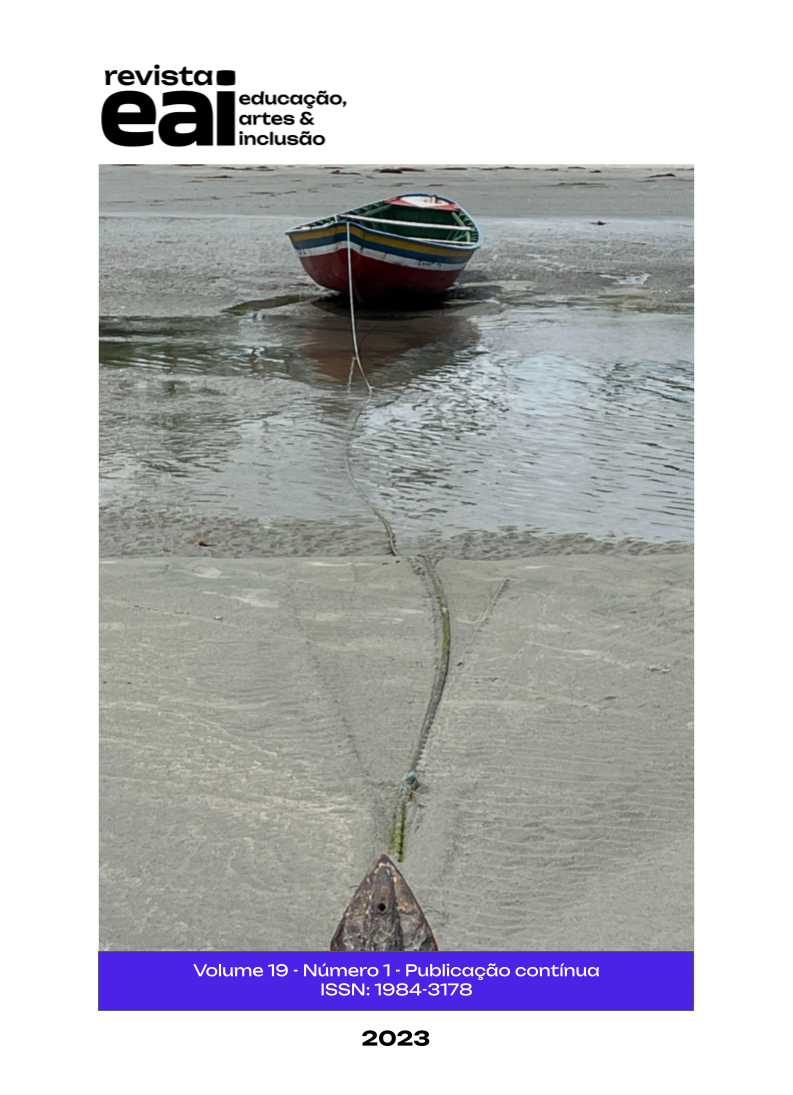Diary of an initiation to teaching
DOI:
https://doi.org/10.5965/198431781820231e0049Keywords:
experience report, teacher education, performative artsAbstract
In this text I present concerns and reflections that emerged in my first teaching practice in artistic education, held in the academic year of 2019/2020 in a public school in Portugal. The work was developed with 05 classes of the curricular component performative arts (theatre), with children from 3 to 9 years old and theoretical foundation mainly from Viola Spolin (2008, 2010) and Augusto Boal (2005). During that school year, the first two months of work were the most difficult. The main challenge was to reconcile what I thought was interesting for students with what they brought, proposed, desired - with who they are. This became my practice: being with ears, heart and sensoriality open to feel how they arrived at each of our meetings and from this perception, to seek for an interaction with them. Often this initiative was “unsuccessful” in the sense that we were unable to produce what would technically be called a class. With the present writing I only organize what was done in order to begin to understand where I am, in the field of the artistic education.
Downloads
References
AGAMBEN, Giorgio. A comunidade que vem. Tradução António Guerreiro. 1a Edição. Lisboa: Editorial Presença, 1993.
BOAL, Augusto. Teatro do Oprimido e outras poéticas políticas. Rio de Janeiro: Editora Civilização Brasileira, 2005.
BOURDIEU, Pierre. A economia das trocas simbólicas. Introdução, organização e seleção de Sergio Miceli. 6a Edição. São Paulo: Ed. Perspectiva, 2007.
CARNEIRO, Beatriz Scigliano. lygia clark e nietzsche-zaratustra: trajetórias. Verve, 7: 244-263, 2005. Disponível em: https://revistas.pucsp.br/index.php/verve/article/view/5030. Acesso em: 31/03/2020.
FOGUEL, Gilvan. Conhecer é criar. Um ensaio a partir de F. Nietzsche. 2a Edição. São Paulo: Discurso Editorial. Ijuí, RS: Editora UNIJUÍ, 2005.
GUATTARI, Félix. ROLNIK, Suely. Micropolítica. Cartografias do desejo. 4a Edição. Petrópolis: Editora Vozes, 1996. Disponível em: https://www.academia.edu/34506646/GUATTARI_Felix_ROLNIK_Suely._Cartografias_do_desejo_livro_completo_. Acesso em 20/03/2020.
RANCIÈRE, Jacques. O mestre ignorante. Cinco lições sobre a emancipação intelectual. Tradução Lilian do Valle. Belo Horizonte: Editora Autêntica, 2002.
SPOLIN, Viola. Jogos teatrais na sala de aula: um manual para o professor. Tradução Ingrid Dormien Koudela. São Paulo: Perspectiva, 2008.
SPOLIN, Viola. Improvisação para o teatro. Tradução e revisão Ingrid Dormien Koudela e Eduardo José de Almeida Amos. São Paulo: Perspectiva, 2010.
Sites Consultados:
Papo de Cinema: https://www.papodecinema.com.br/filmes/nenhum-a-menos/. Acesso em: 03/04/2020.
Dicionário Online de Português. Disponível em: https://www.dicio.com.br/educacao/. Acesso em: 23/03/2020.
Downloads
Published
How to Cite
Issue
Section
License
Copyright (c) 2023 Anna Carolina Coelho Cosentino

This work is licensed under a Creative Commons Attribution-NonCommercial 4.0 International License.
Copyright Statement
The Educação, Artes e Inclusão is a journal that follows the Free Access Policy. The articles published by the journal are free of charge, intended for educational and non-commercial applications. The articles whose authors are identified represent the expression from the point of view of their authors and not the official position of the Educação, Artes e Inclusão Journal or the Educação, Artes e Inclusão Research Group.
Authors who publish in this journal agree to the following terms:
(A) Authors retain the copyright and grant the journal the right of first publication, with the work simultaneously licensed under the Creative Commons Attribution License which allows the sharing of the work with acknowledgment of authorship and initial publication in this magazine.
(B) Authors are authorized to take additional contracts separately, for non-exclusive distribution of the version of the work published in this journal (eg publish in institutional repository or as a book chapter), with acknowledgment of authorship and initial publication in this magazine.
(C) This journal provides public access to all of its content, as this allows for greater visibility and scope of published articles and reviews. For more information on this approach, visit the Public Knowledge Project.
This journal is licensed under a Creative Commons Attribution-NonCommercial-ShareAlike 4.0 International License. This license allows others to remix, adapt and create from your work for non-commercial purposes, and although new work must give you due credit and cannot be used for business purposes, users do not have to license such derivative works under the same terms.



